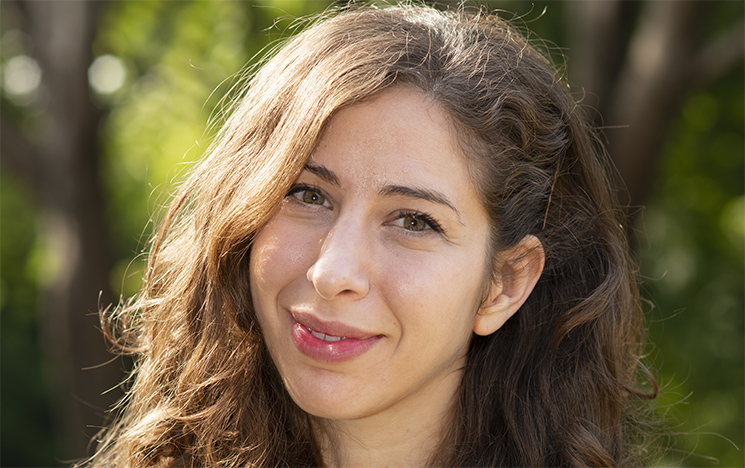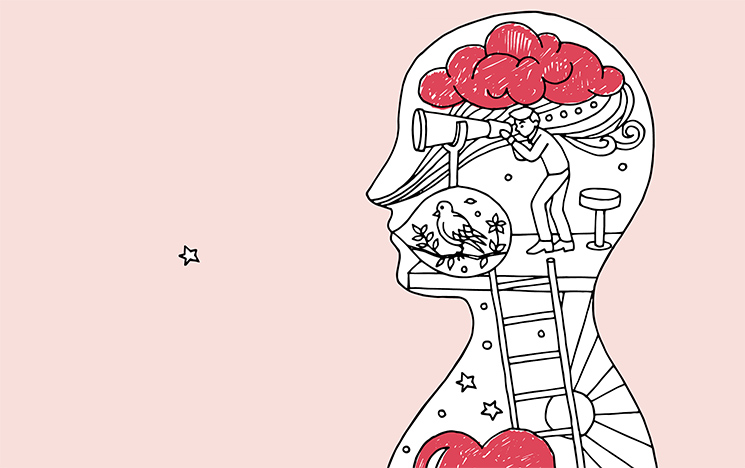A battle for hearts and minds
Rising star Sarah Garfinkel, Professor in Neuroscience and Psychiatry, talks to Rachael Miller about the lesser-known sense of interoception and its potential to improve our understanding and treatment of autism and other conditions.

The heart-mind connection
Sometimes known as the eighth sense, interoception is our understanding of what is happening inside our bodies, from our heartbeat to our gut feelings. People who struggle with the interoceptive sense may have trouble knowing when they feel hungry, full, hot, cold or thirsty, but the ability to tune in to what is happening with our internal organs varies widely between individuals, and evidence is emerging that interoception is linked to how well a person can identify their own emotional state and empathise with others.
Sarah Garfinkel’s interest in interoception was first sparked by her postdoctoral research at the University of Michigan. She studied ‘fear memory’ in war veterans with post-traumatic stress disorder. Although she was looking specifically at brain activity, she began to wonder about the role the heart might play in emotional processing.
She was intrigued that the heartbeats of some veterans remained steady while they were recalling a traumatic experience, but others’ hearts really raced and they experienced other symptoms of hyperarousal (an abnormally heightened state of anxiety that happens whenever you think about a traumatic event). “No-one was really talking about what the body was doing,” she recalls, “and it made me wonder how the body might be interacting with the brain to alter emotion.”
Autism, interoception and anxiety
Coming to Sussex to work with Professor Hugo Critchley at Brighton and Sussex Medical School, Sarah went on to demonstrate that there can be a disconnect between how good people think they are at detecting their own heartbeats and their true accuracy.
Crucially for individuals with autism, she showed that the less accurately they are able to ‘listen’ to their hearts, the higher the levels of anxiety they experience. In a population where 50% suffer with anxiety, this is hugely important.
Now, enabled by an EU grant, Sarah and Hugo have been able to develop a software-based intervention, known as Heart Rater, so that people can train themselves to be more interoceptively accurate.
“Previously,” explains Sarah, “we’d only been able to offer this kind of training in the lab, but this software will mean that people can do it in the privacy of their own homes. We’re working on a roll-out programme with the Sussex Innovation Centre. Their expertise in bringing products to market has been invaluable.”
I want to recognise and nurture the different strengths each person has.”Sarah Garfinkel
Professor in Neuroscience and Psychiatry
Busting the empathy myth
Sarah’s work is also challenging stereotypes about how individuals on the autistic spectrum experience and process emotion. “There’s an idea that they have no emotional response to the emotions of others and they are often referred to as lacking empathy,” she says. But, Sarah’s research shows that when confronted with a strong emotion in another person, an autistic person’s body responds to that emotion, mirroring the body sensations and responses.
“They’ve been told over the years that they don’t have empathy, but that’s simply not true,” she says. “In fact, their bodily response to the pain of others is higher than that in people without autism. It’s possible they have trouble processing these sensations because the brain gets overwhelmed with them, but it’s not that they don’t have them.”
For Sarah, to challenge the misconceptions is a crucial part of what she does. A recent article in The Guardian about her work produced a huge online response. “The Twitter reaction to the article was really heart-warming – people with autism were saying how much it meant to them,” she says.
New possibilities for schizophrenia
With some exciting early findings about how heart signals regulate emotion in schizophrenia, Sarah’s research may also have implications for treatment. “What’s so significant about studying heart-brain interactions is that they give us a whole new window into a psychiatric condition that we wouldn’t necessarily have insight into if we were just looking at the brain,” she says, “and the possibility that we may be able to get away from drugs that may have peripheral unwanted actions or from drug-based therapies entirely is very exciting.”

What are the eight senses?
The five senses of sight, hearing, taste, touch, and smell are familiar to all of us.
Less well known are:
The vestibular sensory system
This helps the body to maintain balance and gives us a sense of spatial awareness.
Proprioception
Our sense of the position, location, orientation and movement of muscles and joints.
Interoception
The sense of what’s going on internally from how fast our heart is beating to whether we are hungry or need to go to the bathroom.
The importance of mentoring
Recognised as an emerging leader in her field, Sarah was recently named as one of 11 outstanding early to mid-career scientists from around the world in the Nature Index 2018 Rising Stars. But, Sarah’s academic journey has had its challenges.
Quite severely dyslexic at school and, by her own admission “doing quite badly” in some of her A-levels, she is hugely grateful to Sussex for the kindness and support she has experienced both as a student and as a member of staff.
“I even failed my first term as an undergraduate and I contemplated dropping out. If it wasn’t for the kindness of one of my tutors, who told me, ‘Don’t be discouraged, you speak really well in class, and your writing will catch up’ – I wouldn’t be here today.”
The support of mentors, such as her PhD supervisors, Professors Dora Duka and Zoltan Dienes, continued what she sees as the powerful mix of ‘heart and brain’ exemplified by Sussex. “I genuinely believe there’s a culture of kindness and excellence here. It’s so important. Academia can be tough, critical and vicious, but for us to do our best and most creative and progressive work, we need to be comfortable and free to explore ideas. Hugo Critchley has created a kind and supportive environment that really allows us to grow into the best scientists we can be.”
As a mentor herself, Sarah is passionate about supporting her students as individuals. “There can be a temptation as a supervisor to turn all your students into ‘mini-mes’,” she says. “I want to recognise and nurture the different strengths each person has rather than trying to make them into something they’re not. It’s important to remain open and alert to the unusual areas in which someone might excel and make them feel good about everything they have to offer. I want so much for all my mentees to do well.”